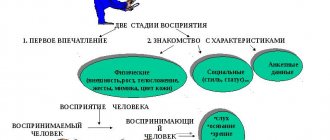Author of the material:
Igor Lyadsky
Geneticist, writer, business coach, Doctor of Philosophy (PhD).
Don’t feed scientists bread, let them delve into human nature. Psychotypes based on visual, tactile or auditory perception are not enough for them. But no, they came up with another one, and they called it intricately - discrete (aka digital). Psychologists don’t care, they just want to make a new discovery. But few people care how other people deal with all this. How to understand who a discrete person is? How is he different from other people? Is it even from this planet? How to be friends with him, communicate, educate, build relationships? The task is not easy, but doable.
Who is discreet?
A discrete person is a person who understands the world through logical analysis. Of course, he also sees, hears and feels like other people, but he does not attach importance to the information until he comprehends it and compares it with his experience. Discrete people are born philosophers, although a small remark needs to be made here.
Take the perception type test
It is believed that children do not have this type of perception of the world. Babies mainly experience the surrounding reality by touch and taste. Then there is a specialization in visual (visual), auditory (auditory) or tactile perception (kinesthetic). A person becomes discrete as he grows older. The debate is still ongoing and no one has won a final victory. On the one hand, a person’s inclinations are formed even before birth, and on the other hand, digital skills do not appear immediately, which proves the enormous role of upbringing.
Historically, people prone to philosophizing also did not appear immediately. Primitive society was not very different from wild animals, relying on smell and touch. Also, people of that time had well-developed hearing and vision in order to notice danger or potential prey in time. They did not have time to use their imagination, since they had to live here and now. But then something happened and humanity made a huge leap in its evolution. It began to think, analyze, compare facts, and derive patterns. That is, do everything that discretes differ in. This does not mean that other psychotypes are stupider. It’s just that digital analysis works best.
"Cogito, ergo sum"
The phrase “I think, therefore I am” is a real slogan of discretes. Its author, the French philosopher Rene Descartes, built an entire harmonious system of knowledge based on rationalism and logical thinking. Subsequently, many outstanding philosophers returned to his thoughts, including Emmanuel Kant.
Digital is also a thinker, but not always of an academic orientation. He may turn out to be a neighbor on the landing, a salesperson in a store, or a guy who came on a date. Moreover, discreteness is also found among women. So, “he” can easily turn out to be “she”, and the digital girl, not the guy, will come on a date.
The type of worldview does not depend on gender and skin color. A different opinion simply symbolizes stereotyped thinking and a narrow view of the world. Although traditionally, men are credited with a logical mindset, and women are credited with a penchant for sensory perception.
Considering the tendency of digital to analyze, it is enough for this type of personality to simply learn to manipulate others. He can observe a person and understand what type of perception dominates in him, so that he can then mirror his behavior. He will present information to the visual with the help of vivid images, to the auditory he will “hang noodles on the ears,” and he will captivate the kinesthete with his sensuality and physicality.
Depending on the goals pursued by the discrete, such behavior can be both negative and positive. For example, if a good manager tries to improve the work of the company by finding an approach to each employee, he is certainly doing a good deed. If a swindler adapts to a person in order to fool him, the dark side of digital is evident. But this is more likely the moral side of the phenomenon than the influence of a specific psychotype.
Take a personality type test
Who do discrets work for?
Often discrete or digital people are very educated people with a large amount of knowledge and experience in various fields of human activity. This contributes to the fact that the discrete perceives the world through the prism of logic and analytical conclusions for every situation that happens to it.
Some people become digital not only because of life’s difficulties. Most people unconsciously change their psychotype due to their chosen profession:
- many digital or discrete people become good psychologists, since their own rich life experience significantly helps to succeed in this profession;
- Programmers can also be classified as a digital psychotype due to the fact that their work mainly concerns only computers and software, and not living people. In this way, human thinking can change towards rationality and specificity, rather than human emotions;
- Researchers and scientists can also be called digitalists because of their specialization directly related to analytics, scientific research, for which it is important to have critical and logical thinking.
We can conclude that discrete is a special human psychotype that can be possessed by any rational person who works with facts, logic and science. Pure discretes, like auditory, visual and kinesthetic learners, are rarely found.
A person’s psychotype is an unstable system that can very often change along with a person throughout his life’s journey.
In this video you will learn about personality types:
How to recognize discrete?
To make sure that there is a discrete (digital) in front of you, you need to listen to what it says and how it does it. Such a person will speak the language of logic, analyze facts, and rely on statistics. His speech, as a rule, is devoid of intonation and emotional coloring. The words “correctly”, “logically”, “therefore”, “firstly”, “one can conclude”, “thus”, “as is known” are often heard.
If you fantasize a little and mentally transport yourself to the future, then your discrete interlocutor can be compared to a smart robot who speaks correct, but unemotional words. Such a person prefers to talk about the functionality and benefits of an object, but not about its appearance.
During a conversation, he is discreet and closes his eyes, avoiding eye contact. Thus, he penetrates deeper into the essence of the dialogue, without being distracted by external factors, including the interlocutor’s facial expressions. His emotional intelligence is not so developed, so the digital pays more attention to the meaning of what is said, rather than the accompanying clues coming from “body language.”
People with this type of perception tend to prefer a strict style that is practical. His love for pragmatism extends to everything in his environment, including his apartment, office, and car. Discrete people are not characterized by strong self-expression and unnecessary attention.
Take the EQ emotional intelligence test
The most logical psychotype
More recently, a new type of psychotype was discovered
Let's start with the fact that many may not understand the term “psychotype”.
This is a combination of human character traits that describes the psychological type of a person from the point of view of psychology itself.
These are the features that distinguish him from others, shape his attitude towards life and the world around him, and influence his worldview.
You will never meet a visual or kinesthetic person in their pure form. A person’s worldview will always vary depending on different life situations, but still one psychotype can be the main one and prevail in a person over the others.
Scientists have always identified three human psychotypes:
- auditory;
- visual;
- kinesthetic.
Until recently this was the case. But several decades ago, scientists came to the conclusion that there is another type of psychotype - discrete or digital. The name comes from the English word digital and translates as prudent, cautious, discreet or discrete.
A special feature of digital is the ability to evaluate and perceive the world using logic and analytics. Very often, people with this psychotype become mathematicians, programmers, chess players, lawyers, and so on.
When communicating with people of other psychotypes, digitals can successfully adapt to their type of communication and perception. So, for example, when communicating with an auditory person, the discrete will try to find a common language with him using lively and vivid speech, predicate words that the discrete itself usually does not use.
How to communicate with a discrete person?
When the psychotype is identified, the moment of further communication comes. If you can’t escape, you will have to enter into a dialogue in which the main emphasis will be on logic and evidence. It’s not enough for digital to hear that some fruit is healthy. He needs to explain why, thanks to which vitamins and microelements. It’s even better if it’s written by American scientists.
If we are talking about some everyday issue, then the discrete person makes the most practical and rational decision. Even ordinary shopping takes the form of Socratic conversations, named after the famous ancient Greek philosopher who brilliantly led any discussions. Why this particular suit? How practical will it be? Will it go out of fashion soon? In general, the option “I take it because it’s beautiful” will not work in the case of a discrete device.
How to raise discrete children?
A separate option for communication is education. In childhood, digitals are rare, especially pronounced ones. This psychotype manifests itself during adolescence. Basically, logical thinking is formed under the influence of the environment, although the influence of heredity cannot be denied. The tendency to intellectual activity is inherited, but manifests itself in the process of upbringing and training.
From these positions, it is difficult to judge the reasons causing the appearance of discreteness; either it is the implementation of internal programs, or a consequence of artificially created conditions. In general, there is an opinion in the literature that this type of perception is formed as a result of mental trauma, when a person suppresses his feelings and emotions, escaping into the world of logic.
As a rule, children from disadvantaged families who grew up in emotionally difficult conditions become digitals. It is difficult to judge how true this is, just as it is difficult to think about the “defectiveness” of the named psychotype. Rather, we are talking about an independent phenomenon that objectively arises in the world, in response to new challenges and tasks of reality.
So, digital people need to be educated, and not re-educated, as at one time it was recommended to do with left-handers, and hundreds of thousands of Soviet children were forced to learn to write with their right hand. The world is diverse and there is a place for everyone in it, including a left-handed person, a discrete person or someone else. It’s just that in the educational process, it is necessary to pay attention to the peculiarities of human perception. If he needs proof and logic, give it to him. Don’t force him to cram and take it on faith, but explain it using examples from life that will relate to his personal experience.
Take a temperament test
Characteristics of the psychotype
“Pure” samples in real life are very rare, since they, like many others, receive and process information through various analyzers. We can only say that this type of perception prevails among these people.
Digital people are those who have high analytical abilities. It is believed that they can become manipulative, adapting to others and imitating their behavior.
How do you know that the person next to you is discrete? His speech is often unemotional; he uses the following constructions: “logical”, “let’s look at it”, “therefore”, “from here we will conclude”, “firstly,... secondly”.
He rarely talks about the beauty of anything, but immediately notes the functionality of a thing or its benefits . It is believed that such a person rarely makes eye contact - visual contact distracts him, the look of another person is “extra” information for him.
There is an opinion that discrete people are former kinesthetic learners who, as a result of traumatic situations, have learned to hide their feelings and control emotions and preferences. Whether this is true or not, psychology does not give a definite answer. The second type of people who become digital are often scientists, businessmen, politicians, for whom the process of perception begins to be carried out through the prism of logic.
Communication with discrete
Typically, digital people have a straight posture and a raised head, and their arms are crossed when talking; their posture can be “frozen.” Their movements are not flexible, often abrupt. They prefer to keep physical distance from other people.
Some believe that the discrete personality type is characterized by great difficulties in communication: these people cannot open up to others, so they are often perceived as closed and complex. But, most likely, this is due to the fact that digital people cannot stand communicating with stupid people (of which, in their opinion, the vast majority).
Discrete loves to work with documents, look for facts, confirm them, find cause-and-effect relationships, and formulate conclusions. Likes to explain complex things in simple words. What he values most in an interlocutor is intelligence.
In ordinary life, discretes are calm, pedantic and prefer to communicate on business.
As a rule, digital types of people are highly educated . The question of the cause-and-effect relationships between education, scientific activity and the manifestation of such a personality type as discrete remains open in psychology. Some believe that this feature of perception influences the choice of subsequent profession. Others believe that it is under the influence of specific activities that discretes are obtained.
A conversation with this person should be based on logical connections and well-grounded facts. You should not expect that he will be able to celebrate the beauty of people, things, phenomena and express enthusiasm for anything. Discrete people are usually the type of people who often lack empathy. He experiences great difficulties in perceiving information that is carried out through feelings and emotions.
Discrete occurs among:
- lawyers;
- programmers;
- mathematicians, physicists;
- economists;
- biologists;
- critics (literary, theatrical, etc.);
- engineers;
- psychologists;
- doctors.
All people have a mixed type of perception; it is extremely difficult to meet a 100% digital one. It can clearly manifest itself only in certain life circumstances (for some it can happen, for example, under stress, for others during the learning process, etc.).
So, discretes are people for whom rationality prevails over feelings. They prefer to cognize and perceive the entire world around them using logic. Psychology cannot yet give an exact answer to the question of whether this feature is congenital or acquired.
What professions are suitable for discrete people?
Based on the characteristics of thinking and worldview, digitals find themselves in disciplines associated with an analytical mindset. Suitable professions include lawyer, attorney, detective, mathematician, physicist, programmer, psychologist, philosopher, analyst, statistics or standardization worker, analyst, mechanic, engineer, economist, sociologist, literary critic.
Considering that pronounced psychotypes are rare, as a rule, people combine several main channels for obtaining information. So, a discrete person can combine an auditory or visual type of perception, which will also be reflected in the choice of profession. But he is unlikely to be a “part-time” kinesthetic person, since he avoids sensuality and emotionality, so he is not often found among massage therapists or dancers.
How to build relationships with discrete people?
If someone manages to come into contact with digital not only in a professional or friendly way, let them prepare for a “flurry” of emotions and a “storm” of tenderness. This psychotype is very poor in sensory manifestations, but can be a faithful companion and reliable partner. Since opposites attract, they are able to converge with representatives of other psychotypes, balancing them.
In a discrete-visual couple, he will take on the role of a “sobering” factor, preventing the other from overspending on beautiful but useless things. He will always find something to “pour” into the ears of an auditory person. Well, a couple with a kinesthetic student generally repeats the eastern “Yin and Yang”, which can harmoniously complement each other. Considering that pure psychotypes are rare, there are even more points of contact between them.









